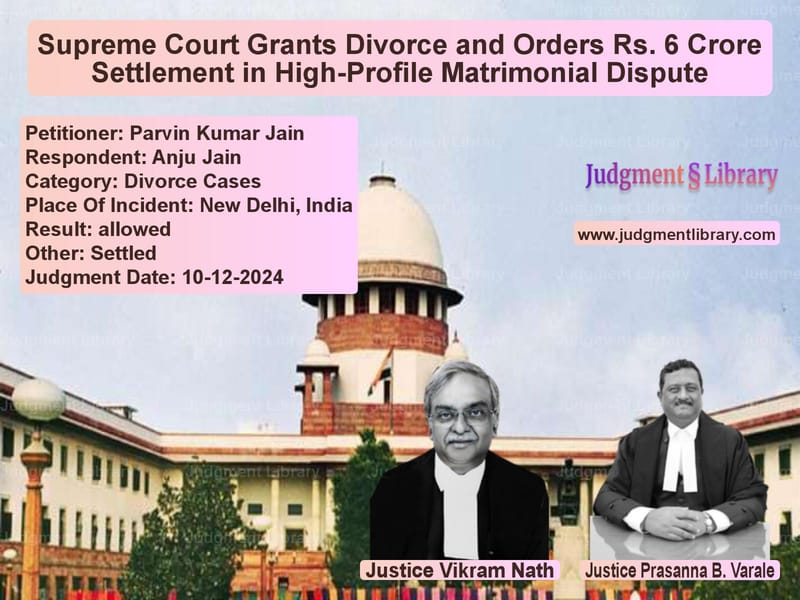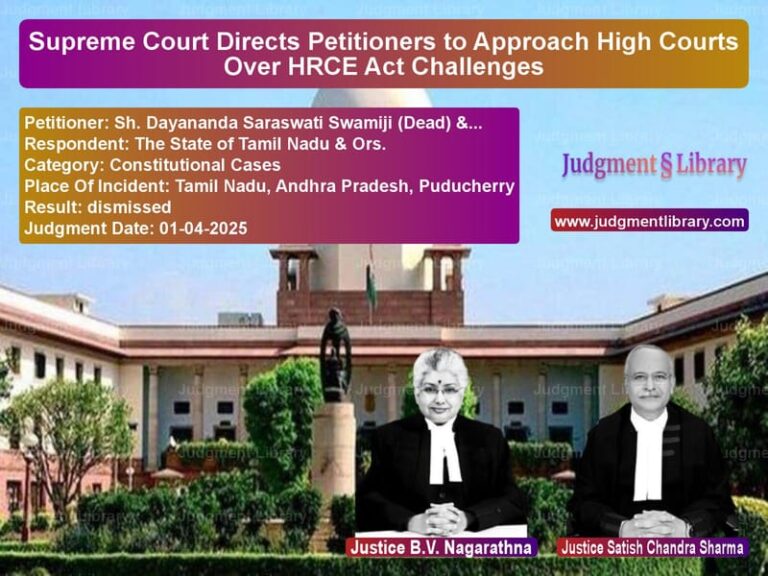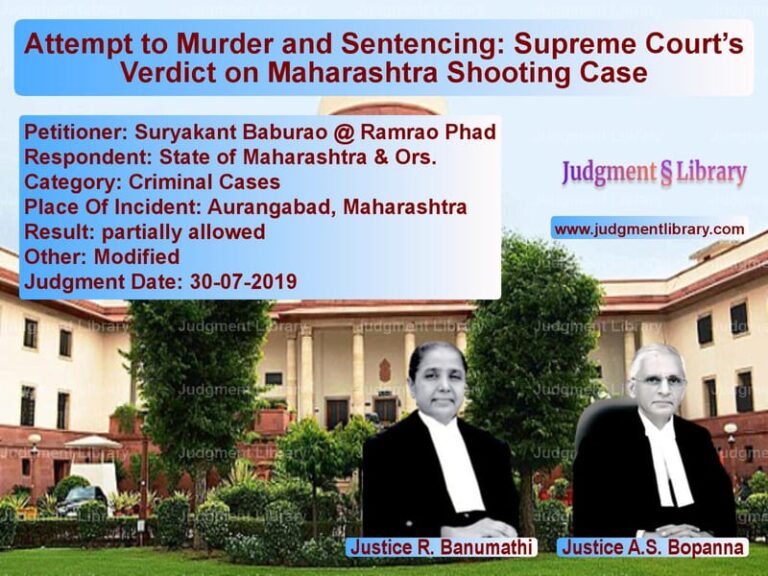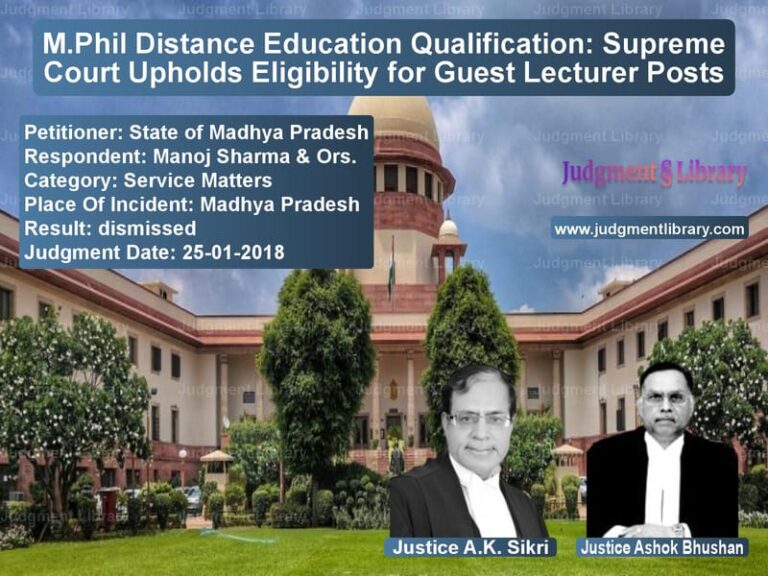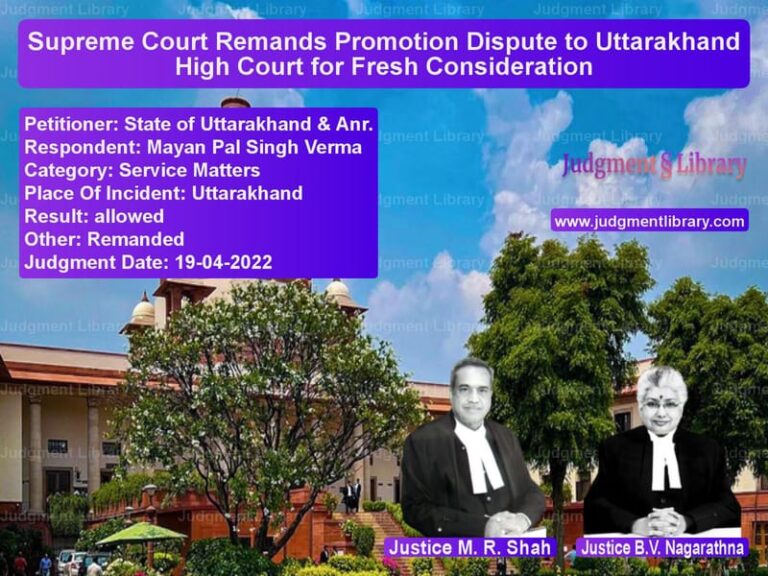Supreme Court Grants Divorce and Orders Rs. 6 Crore Settlement in High-Profile Matrimonial Dispute
The Supreme Court of India, in the case of Parvin Kumar Jain vs. Anju Jain, dissolved the marriage between the parties and ordered a one-time settlement of Rs. 6 crore as permanent alimony and financial security for the son. The judgment, delivered by Vikram Nath and Prasanna B. Varale, was passed under Article 142 of the Constitution to ensure a fair resolution of the prolonged matrimonial dispute.
Background of the Case
The case involves a long-standing marital dispute between the petitioner (husband) and respondent (wife), who were married on December 13, 1998. The couple has a son born on May 28, 2001. However, due to severe matrimonial discord, they have been living separately since January 2004. The husband had initially filed for divorce on grounds of cruelty under Section 13(1)(ia) of the Hindu Marriage Act (HMA), 1955. Meanwhile, the wife filed for pendente lite maintenance under Section 24 of the HMA.
The legal battle saw multiple rounds of litigation. In 2016, the husband withdrew the divorce petition, leading to disputes over whether maintenance proceedings could continue post-withdrawal. The case eventually reached the Supreme Court after appeals against the Delhi High Court’s ruling.
Legal Issues Considered
- Does the withdrawal of a divorce petition terminate the Family Court’s jurisdiction over maintenance proceedings?
- Is the wife entitled to enhanced maintenance despite the husband’s withdrawal of divorce?
- Should the marriage be dissolved under Article 142 of the Constitution?
- What is the appropriate quantum of permanent alimony?
Arguments by the Petitioner (Husband)
The husband, represented by Senior Advocate Sidharth Luthra, contended:
- Since he withdrew the divorce petition, the Family Court became functus officio and had no jurisdiction over maintenance proceedings.
- The wife had filed false affidavits and misrepresented financial details to obtain higher maintenance.
- He had already been voluntarily paying Rs. 65,000 per month since July 2015.
- He was not liable to pay maintenance for his son beyond 18 years, as per Section 26 of the HMA.
Arguments by the Respondent (Wife)
The wife, represented by Senior Advocate Meenakshi Arora, countered:
- Despite the withdrawal of divorce, the maintenance proceedings were independent and could not be nullified.
- Her financial needs and those of the son had significantly increased.
- The husband, a high-earning professional, concealed his true financial status to evade maintenance obligations.
- As the son was still pursuing higher education, he was entitled to financial support.
Supreme Court’s Observations
On Jurisdiction of Maintenance Proceedings Post-Withdrawal
The Court ruled:
“The jurisdiction of the Family Court under Sections 24 and 26 of the HMA does not cease merely because the divorce petition is withdrawn. The purpose of these provisions is to ensure financial stability for the dependent spouse and child.”
On Financial Disclosures
The Court found that the husband had deliberately withheld financial information to minimize his maintenance obligations:
“He was evasive in disclosing his actual income, assets, and investments. Evidence showed his salary exceeded Rs. 10 lakh per month, with additional assets worth over Rs. 15 crore.”
On the Irretrievable Breakdown of Marriage
The Court invoked its power under Article 142, stating:
“The parties have been separated for over two decades, have irreconcilable differences, and their marriage exists only in name. There is no purpose in prolonging this dead relationship.”
Final Verdict
The Supreme Court issued the following directives:
- The marriage between the parties is dissolved under Article 142.
- The husband is directed to pay a one-time settlement of Rs. 5 crore to the wife as permanent alimony.
- The husband shall pay an additional Rs. 1 crore for the financial security and education of their son.
- The entire amount must be paid within four months.
Impact of the Judgment
This ruling has far-reaching implications:
- Strengthens financial rights of dependent spouses in long-drawn matrimonial disputes.
- Clarifies that maintenance proceedings are independent of the divorce petition.
- Upholds the principle of financial transparency in maintenance cases.
- Ensures justice through equitable alimony settlements.
The judgment reinforces the notion that a long-standing dead marriage should not be legally sustained at the cost of emotional and financial hardship.
Petitioner Name: Parvin Kumar Jain.Respondent Name: Anju Jain.Judgment By: Justice Vikram Nath, Justice Prasanna B. Varale.Place Of Incident: New Delhi, India.Judgment Date: 10-12-2024.
Don’t miss out on the full details! Download the complete judgment in PDF format below and gain valuable insights instantly!
Download Judgment: parvin-kumar-jain-vs-anju-jain-supreme-court-of-india-judgment-dated-10-12-2024.pdf
Directly Download Judgment: Directly download this Judgment
See all petitions in Alimony and Maintenance
See all petitions in Child Custody
See all petitions in Divorce by Desertion
See all petitions in Property Division in Divorce Cases
See all petitions in Judgment by Vikram Nath
See all petitions in Judgment by Prasanna Bhalachandra Varale
See all petitions in allowed
See all petitions in settled
See all petitions in supreme court of India judgments December 2024
See all petitions in 2024 judgments
See all posts in Divorce Cases Category
See all allowed petitions in Divorce Cases Category
See all Dismissed petitions in Divorce Cases Category
See all partially allowed petitions in Divorce Cases Category

